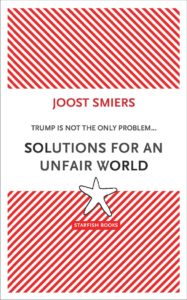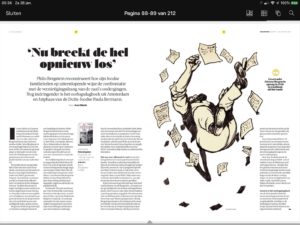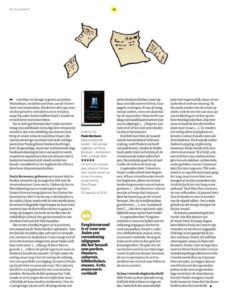Noam Chomsky: Ocasio-Cortez And Other Newcomers Are Rousing The Multitudes
A quick glance around the world today reveals that politics almost everywhere — from the federal government shutdown in the US to the power struggle in Venezuela and from Macron’s crisis in France and UK’s Brexit nightmare to the Israeli-Iranian rivalry – are engulfed in a state of uncertainty and turmoil. Meanwhile, oligarchy is replacing democracy as the widening social and economic gap between rich and poor continues unabated. So, who rules the world now? The US is in a state of relative decline, but neither Russia nor China has the capacity to control global developments. How do the super-rich and corporations factor into this equation? In this exclusive interview, world-renowned linguist and social critic Noam Chomsky provides penetrating insights into some of the most critical developments going on in the world today.
C.J. Polychroniou: After 35 days of a partial government shutdown, Trump signed a three-week funding bill but without securing money for the border wall. Leaving aside for the moment the surrealist nature of contemporary US political life, do you detect some hidden political strategy behind Trump’s funding conflict over the border wall with the Democrats?
Noam Chomsky: There’s a political strategy, but I’m not convinced that it’s hidden. With Trump, everything is pretty much on the surface. There have been constant efforts by political analysts to discern some deep geostrategic or sociopolitical thinking behind his performances, but they seem to me unconvincing. What he does seems readily explained simply on the well-grounded assumption that his doctrine is simple: ME!
Trump understands that he has a primary constituency — extreme wealth and corporate power — and that he has to serve its interests or he’s finished. That task has largely been assigned to the Ryans and McConnells, who have performed it admirably. Profits are skyrocketing, real wages are barely increasing despite low unemployment, regulations that might limit greed (and help mere people) are being dismantled, and the one legislative achievement — the tax scam — put lots of dollars in the right pockets and created a deficit that can be used as a pretext to undermine benefits. All is working smoothly — with analogues worldwide.
But Trump must maintain enough of a voting base to stay in power. That requires posturing as the defender of the ordinary guy against hated “elites” (always suppressing the true “masters of mankind,” to borrow Adam Smith’s phrase for the merchants and manufacturers who were “the principal architects” of policy). This act is helped along by such figures as Rush Limbaugh, who instructs his tens of millions of followers that they should beware of “the four corners of deceit: government, academia, science and media,” institutions that “are now corrupt and exist by virtue of deceit.” So, he argues, just listen to ME.
Meanwhile Trump must rise to the defense of the masses from awesome threats, chief among them now the hordes of “rapists,” “murderers” and “Islamic terrorists” he says are being mobilized down south to storm across the border and slaughter decent law-abiding white Christian Americans. We must therefore have a “beautiful wall” — which they will pay for. Trump promised that, and to back down would not only betray the trembling masses but also be a defeat, which his ego cannot tolerate.
The game is not really new. After all, the revered Ronald Reagan bravely donned his cowboy uniform and declared a National Emergency to protect the country from the Nicaraguan army, supposedly poised to destroy us all only two days’ drive from Harlingen, Texas. Trump is only carrying it further, helped by the fading of such infantile notions as “truth” — or “false realities,” to borrow Jared Kushner’s innovation. Former Secretary of State Dean Acheson’s admonition that policymakers must be “clearer than truth” has long passed into obsolescence. They can do far better in the atmosphere of “alternative facts” for those liberated from the four pillars of deceit.
I doubt that there is any deeper political strategy. Read more
Vijf sterren in de Volkskrant. 26.01.19
Trix van Bennekom ~ Abraham. Kroniek van een politieke dynastie
 Eén van de families die de geschiedenis van Bonaire mee bepaald heeft, is de familie Abraham.
Eén van de families die de geschiedenis van Bonaire mee bepaald heeft, is de familie Abraham.
Trix van Bennekom begint het verhaal in de Heilige Vallei in het noorden van Libanon. Die vallei bood meer dan duizend jaar bescherming aan een vroegchristelijke geloofsgemeenschap, de Maronieten.
Daar, in het dorpje Serhel, werd Julian Antonio Abraham geboren in 1870. Deze Julian maakte in 1895 de stap naar de nieuwe wereld. Hij emigreerde naar Amerika. Maar al snel vertrok hij naar Venezuela, om uiteindelijk zich in 1903 op Curaçao te vestigen.
Binnen de familie Abraham deden diverse verhalen de ronde over hun afkomst. Maar niemand wist van deze achtergrond. Het plezier over de reconstructie straalt van het gezicht van Van Bennekom als ze over deze vondst vertelt. Voor een biograaf is er natuurlijk ook niets mooiers te bedenken. Zo geef je de familie waarover je schrijft haar geschiedenis terug.
Het boek verhaalt over de drie Abrahammen die in de politiek van het eiland een grote rol hebben gespeeld. In de typeringen van Van Bennekom: Julio, de man van het volk, Toon, de zakenman-politicus en Jopie, de revolutionair.
Wat het boek bijzonder maakt, naast de mooi geschreven portretten, is de beschrijving van de tijd waarin de drie politieke carrières zich afspeelden. Van Bennekom verhaalt niet alleen de geschiedenis van het Caribisch gebied, maar ook de verhouding van dat gebied met dat moederland daar in Europa.
De combinatie van de persoonlijke en de grote geschiedenis maakt Abraham een rijk boek.
Uitgeverij Village – Imprint VanDorp uitgevers – ISBN 978 94 61852 120
Solutions For An Unfair World ~ Contents & Introduction: Consternation
Contents
Consternation
1. The world in which we live is too complex
2. We have to bring trade under democratic control
3. Curb globalisation: a dialogue between the veritable left and the simplifying right
4. Peace in our time?
5. A president with messy moral standards
Bitter tears, bon courage
About the author & Acknowledgement & Literature
Consternation
After November 8, 2016, I have occasionally thought that the governments of civilised nations should recall their ambassadors from the United States, for consultation as it is called; I’d rather say for consideration. Thus far that recall did of course not happen, but consideration is more than ever necessary. After one year it is abundantly clear that Donald Trump’s government has not left relations within the us and the rest of the world untouched.
Obviously, us citizens must set their own course, but as residents of all corners of the world we have to consider what this Trump is doing. Let me mention in this essay a few points that we have to think about. What can we still expect, what have we already seen, how did that affect us, and how can we respond appropriately?
A warning is called for, and it comes from Luigi Zingales – as his name suggests an Italian, who is a professor in the United States. Make the comparison with Berlusconi, he suggests, and deduce lessons from that. ‘Mr. Berlusconi was able to govern Italy for as long as he did mostly thanks to the incompetence of his opposition. It was so rabidly obsessed with his personality that any substantive political debate disappeared; it focused only on personal attacks, the effect of which was to increase Mr. Berlusconi’s popularity.’ (New York Times, 22.11.16)
The purpose of this essay is not to fall into that trap. The election of Trump forces us, more than anything else, to consider some fundamental issues. At the same time we should not be afraid to formulate ambitious solutions. It is still possible to build a civilised, human, just and ecologically sustainable world. We need radical proposals for that, which I would like to present here in five – in principle separately readable – chapters. Read more
Solutions For An Unfair World ~ The World In Which We Live Is Too Complex
 It is beyond any doubt: for many citizens life in the second decade of the twenty-first century is difficult. Many are burdened with debt. In the United States and, for example, in Spain, residents can be evicted from their homes at any time. The chance that people will find a decently paid job is decreasing. Long-term unemployment is rather rule than exception. Industries are disappearing. Many suburbs need proper maintenance, but it’s not happening, and the police there will not always be seen as your best friend. Worst of all perhaps is that the social safety nets, which have helped people through difficult times in their lives, are becoming increasingly wide-meshed. You often are on your own, in an environment in which you suspect – or are convinced – that immigrants are driving you out of the housing and job market, and have easier access to social services. The neighbourhood in which you live has less social cohesion than before, and mutual trust is gone. Daily life has almost no certainties anymore.
It is beyond any doubt: for many citizens life in the second decade of the twenty-first century is difficult. Many are burdened with debt. In the United States and, for example, in Spain, residents can be evicted from their homes at any time. The chance that people will find a decently paid job is decreasing. Long-term unemployment is rather rule than exception. Industries are disappearing. Many suburbs need proper maintenance, but it’s not happening, and the police there will not always be seen as your best friend. Worst of all perhaps is that the social safety nets, which have helped people through difficult times in their lives, are becoming increasingly wide-meshed. You often are on your own, in an environment in which you suspect – or are convinced – that immigrants are driving you out of the housing and job market, and have easier access to social services. The neighbourhood in which you live has less social cohesion than before, and mutual trust is gone. Daily life has almost no certainties anymore.
Of course we do not know this precisely, but the shaming of the political elite that is the order of the day may have something to do with this. After all, is it not the responsibility of politics to provide citizens with a safe and secure existence?
When we think about this, some paradoxes stand out. First of all, there is hardly any anger directed at the business establishment. The leaders of big companies always claim to be the true leaders of the free world, but if something goes wrong in society – and that is really the case now – they are not held responsible. Secondly, by confronting the political elites angry citizens make it abundantly clear that they expect a lot of care from the government. Despite decades of neoliberalism – which advocated the perishing of the state – for many citizens the state still seems to be the entity that needs to keep society in order.
And the third paradox is that citizens have chosen time and again for political leaders who, according to the principles of neoliberalism, have denied the state the financial and organisational means of realising something for individual citizens and the society as a whole. At the same time the state should look after jobs and pensions, affordable health care, safety and everything that gives life perspective. In the absence of resources and competence, states, and thus politicians, can not provide all these things under neoliberal regimes. Nevertheless, the state is expected to deliver protection and social security to its citizens. After all, markets can only flourish if the state is strong enough to make life liveable for its citizens.
The relative impotence of the state to provide citizens with security in their lives is in stark contrast with the power that big companies have acquired over the course of several decades. These are companies that have grown into transnational corporations. Their structure is usually so complex that it is hardly understood what they do – anywhere in the world – and what the consequences might be. They can regard any form of regulation as being irrelevant to them and even prevent these rules from being implemented, including by lobbying at a large scale, wherever appropriate. Such transnational corporations act as collaborative entities that secure their interests on a worldwide scale. Read more
Solutions For An Unfair World ~ We Have To Bring Trade Under Democratic Control
 If we realise that the escalating economic, cultural and social globalisation has brought us too few blessings, the question is what we need to do, and especially what we can do nów. First of all we have to think about the abundance of trade treaties between individual countries – there are thousands of them – and between groups of countries in certain regions – think of NAFTA, CETA, the formerly intended TPP, TTIP, and indeed the European Union –, and about what is governing them at a global level, such as the World Trade Organisation (WTO). In principle, all those treaties have to be revised radically. However, before we come to this, we need to acknowledge that generally it is beneficial that such treaties are aimed at reducing (further) import and export taxes. But that should not be overdone: countries have the right to protect certain sectors of their economy, perhaps only for a certain period of time. It is also useful if such treaties contribute to the joint determination of industrial standards, even though small differences are not insurmountable. But after that, the problems come.
If we realise that the escalating economic, cultural and social globalisation has brought us too few blessings, the question is what we need to do, and especially what we can do nów. First of all we have to think about the abundance of trade treaties between individual countries – there are thousands of them – and between groups of countries in certain regions – think of NAFTA, CETA, the formerly intended TPP, TTIP, and indeed the European Union –, and about what is governing them at a global level, such as the World Trade Organisation (WTO). In principle, all those treaties have to be revised radically. However, before we come to this, we need to acknowledge that generally it is beneficial that such treaties are aimed at reducing (further) import and export taxes. But that should not be overdone: countries have the right to protect certain sectors of their economy, perhaps only for a certain period of time. It is also useful if such treaties contribute to the joint determination of industrial standards, even though small differences are not insurmountable. But after that, the problems come.
Let’s start with the bilateral and regional trade treaties. What is necessary now and in the future is that such trade agreements are being formulated in such a way that they put an end to matters such as tax dumping, environmental degradation, the enormous size and complexity of corporations, and social exploitation. So far, all those trade treaties are silent about the protection of what is of vital importance for citizens and their society – now and in the future. Therefore, those treaties must be renegotiated, reformulated and concluded again. Indeed, that is a hell of a job, which can only succeed if two conditions are met. Firstly, lawyers, economists and social scientists at universities – and scientists at technical and agricultural universities as well – need to set up major research programs to consider how the transition will unfold from the current trade treaties, which undermine democracy and hurt citizens, to trade treaties that serve the interests of these citizens, bringing democracy and market to a good balance.
Secondly, one can imagine that such radical changes can only take shape if substantial sections of the population are committed to this, persistently and well-considered. Perhaps what is being proposed here is not a far-off-their-bed show for the simplifying right. And why could reforming the trade relations between countries – which would bring back national priorities to citizens – not be the basis for alliances between what is called the populist right – what I have previously referred to as the simplifying right – and a from its neoliberal bent returning left? I’ll get back to that. Read more





